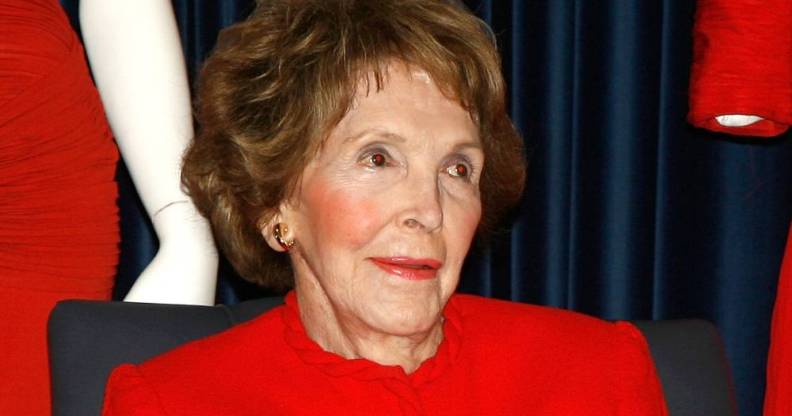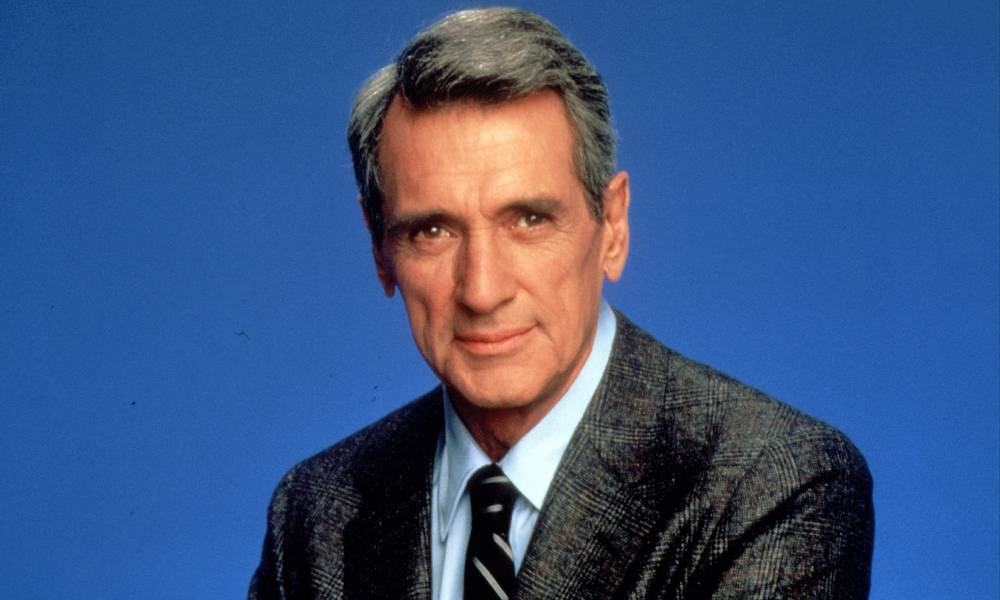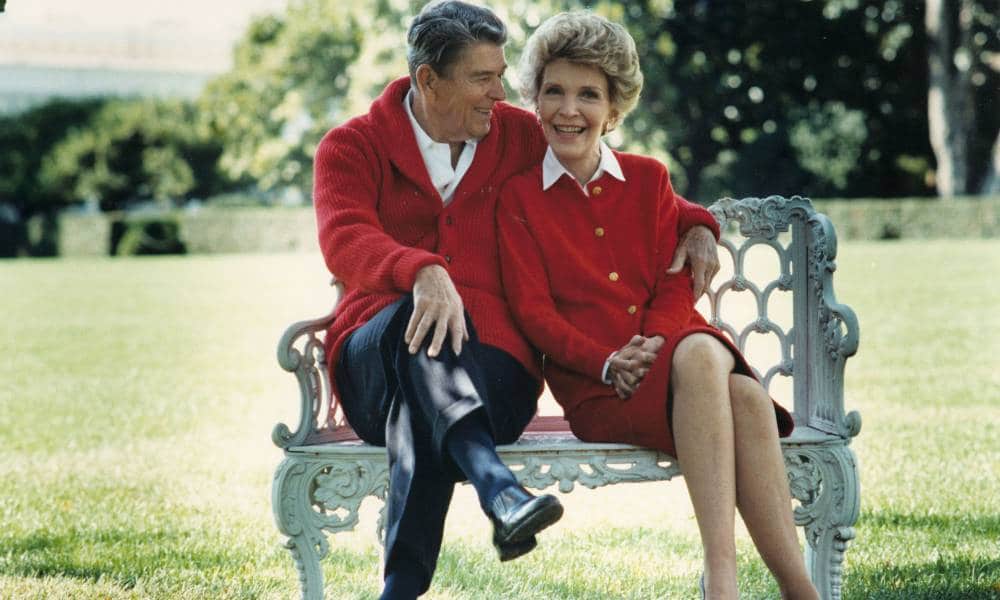Nancy Reagan, who turned her back on the AIDS crisis, honoured by White House on first day of Pride

The White House kicked off Pride Month by announcing a new postal stamp will honour former first lady Nancy Reagan, and it’s been met with fierce backlash online. (Getty/Mark Davis)
The LGBTQ+ community and allies are up in arms after the White House kicked off Pride Month by announcing a new postal stamp honouring former first lady Nancy Reagan.
As the world celebrated the first day of Pride Month, the White House decided to announce that it will be unveiling a new postal stamp to honour the former first lady – ignoring Reagan’s link to the horrific mistreatment and stigmatisation of LGBTQ+ people during her time in the White House.
The first cases of the illness now known as AIDS were reported from Los Angeles in June 1981, just months after Nancy Reagan’s husband Ronald Reagan became president.
For years, the couple were actively silent on the crisis. Ronald Reagan was in office for nearly five years before he said the word “AIDS” in public, and his administration reacted appallingly to the epidemic.
How to announce you have no LGBTQ people on staff. Announcing a stamp on the first day of pride for Nancy Reagan who participated in a genocide against gay men during the AIDS crisis. https://t.co/BJHMD2tCZv
— Alejandra Caraballo ?️⚧️?? (@Esqueer_) June 1, 2022
Uh, happy pride month? https://t.co/8nj2K6FHmU— Parker Molloy (@ParkerMolloy) June 1, 2022
we love our gay icons that announce and endorse nancy reagan, the wife of the president who intentionally made the AIDs epidemic worse pic.twitter.com/deFQjaasUX— transgender marx (@JUNlPER) June 1, 2022
announcing a nancy reagan stamp on the first day of pride month is sick lmao. like it’s not funny but everything is so fucked up where you’re just deliriously laughing and losing it— oatmeal influencer (@acechhh) June 1, 2022
Honoring Nancy Reagan?? During Pride Month???? Oh baby not my gay ass https://t.co/lneR3TCbLf
— grant??? (@urdadssidepiece) June 1, 2022
A 2021 article in The Atlantic claimed that Nancy Reagan, who died in 2016, pushed her husband to address the epidemic behind the scenes; it’s said that she had enormous sway over him.
However, Richard Socarides, a former White House adviser for President Bill Clinton, appraised the situation thus: “When the country needed leadership, president Reagan was not there, and his wife — who was able to do more — was not willing to step up. It reflects rather harshly on both of them.”
In recent years, reports have revealed that Nancy Reagan actively turned her back on Rock Hudson, who was a close friend, when he reached out to the White House for help as he was dying from an AIDS-related illness.
On 2 October 1985, Hudson became the first major US celebrity to die of complications from AIDS, and his death raised more public awareness of the epidemic which had been largely ignored by mainstream media.

A publicist for Rock Hudson, seen here in a photo from 1985, reached out to the Reagans for help after the actor collapsed and needed medical treatment. (Getty/Images Press)
Hudson flew to France in July 1985, during what would be the last months of his life, to seek experimental treatment that wasn’t available in the US. But he collapsed at the Ritz hotel and was taken to hospital.
According to documents published by BuzzFeed, his publicist contacted Hudson’s old friends, the Reagans, to speed up the actor’s transfer to a military hospital. The publicist stressed in a frantic telegram to the White House that Hudson would be able to be seen by Dr Dominique Dormant, a French army medic who previously treated Hudson for AIDS in secret, at this hospital.
But Nancy Reagan declined to help.
White House staffer Mark Weinberg wrote back at the time that he “spoke with Mrs Reagan” about the frantic life-or-death message, and he said that “she did not feel this was something the White House should get into”. Instead, the White House suggested the publicist get in touch with the US embassy in Paris.
Weinberg told BuzzFeed that the Reagans seemed “very sorry for Rock’s condition and felt for him and all the people”. But he said it “just wasn’t something that the White House felt that they could do something different for him than they would do for anybody else”.
Hudson was eventually admitted to the hospital but died in October 1985.
It was 1985 when Ronald Reagan finally spoke on the epidemic, after being asked directly about it by a reporter. He called it a “top priority” and attempted to defend his silence as he claimed his administration had been supporting AIDS research for “more than four years now”.

President Ronald Reagan and first lady Nancy Reagan declined to help Rock Husdon after the actor reached out to get treatment from a pioneering doctor in Paris.(Getty/Ronald Reagan Presidential Library)
In 1986, Reagan’s surgeon general C Everett Koop and the Institute of Medicine/National Academy of Science called for a coordinated response to the epidemic. Reagan did eventually appoint a commission to investigate the epidemic, and the US began taking steps to raise awareness of HIV and AIDS.
In 1987, six years after the first cases of AIDS were reported, the Centers for Disease Control and Prevention rolled out a multi-part public awareness campaign known as “America Responds to AIDS”. By then, about 47,000 people had been infected with HIV in the US, according to History.com.
The Reagan administration’s silence towards the AIDS epidemic has left a lasting stain on America’s queer history. Even now, the US has restrictions on gay, bisexual and queer men donating blood – which came out of the HIV and AIDS crisis in the 1980s.
In January, the Biden administration admitted that archaic blood donation bans have had a “painful” legacy on the LGBTQ+ community. A White House official claimed Biden is “committed to ensuring that this policy is based on science, not fiction or stigma”.
Yet, the blood donation ban remains despite fierce outcry from LGBTQ+ advocates, politicians and medical experts,
Current first lady Jill Biden will host a reception on Monday (6 June) to reveal the new stamp alongside embattled US postmaster general Louis DeJoy.
Fred Ryan, the chairman of the board of trustees at the Ronald Reagan Presidential Foundation, and Reagan’s niece Anne Peterson will also be in attendance.

